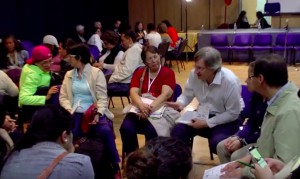By Professor Alicia Cabezudo, Vice President of International Peace Bureau, October 31, 2015, published in CPNN-world
 “The process of educating for peace must begin many years of listening to each other” – David Adams, Round Table on Community Education and Education for Peace.
“The process of educating for peace must begin many years of listening to each other” – David Adams, Round Table on Community Education and Education for Peace.
On 1 and 2 October the “National Encounter for Peace Education” was held in Bogota to develop a strategy of information, reflection and building public awareness of the issues of peace in the present context. More than 600 people attended the event that started with a theatrical performance “Memoria, Manos a la Obra”
The two-day meeting discussed the current context of peace, in the framework of the dialogue and agreements in Havana, the demands of educators, students, sectors and social movements, as well as the need for truth and reconciliation, in the context of education for peace.
At the meeting, teachers shared their knowledge and experiences on human rights education, citizenship skills, citizenship education, ethics education in relation to education for peace and on issues linked to inclusion, reparations and social reintegration from the perspective of those who have been victims. On the second day participants analyzed the progress and needs of education for peace at the regional level, in the context of national and regional education policies for peace. The discussions will be published as Proceedings of the Congress in the coming months.
Peace as a concept; education for peace and social construction of knowledge related to the field of non-violence are some of the issues that Professor Alicia Cabezudo shares in an interview with Coexistence Foundation as a contribution to the peace process that is taking place in Colombia.
Read the original article here.

Leave A Comment
You must be logged in to post a comment.